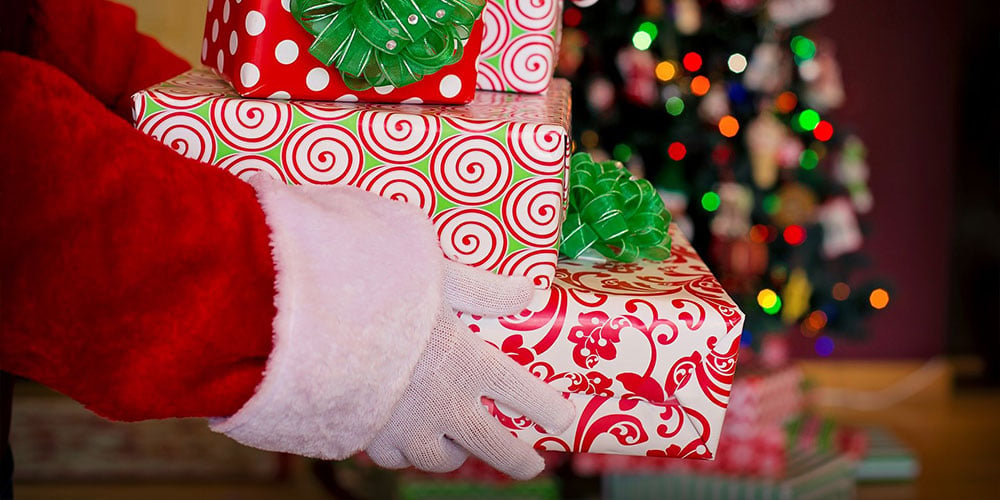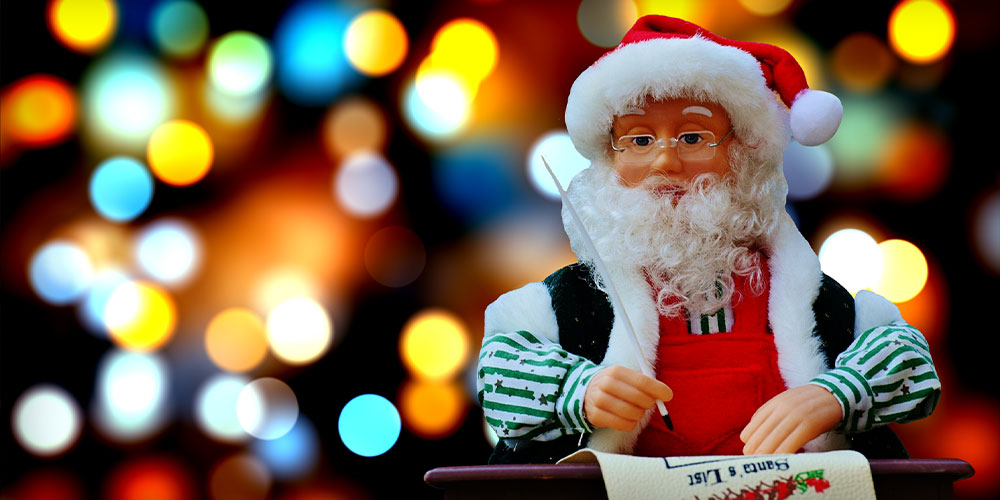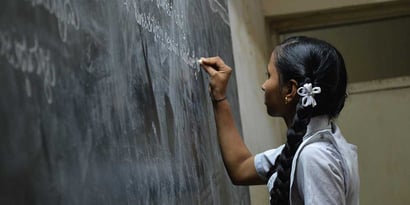Contents
- How do kids find out Santa doesn’t exist?
- When should you tell your kids that Santa isn’t real?
- How do you make finding out the truth about Santa easier?
Few childhood experiences match the magical anticipation of bedtime on Christmas Eve followed by the cold clear light of a Christmas morning bringing with it the empty glass, the half-eaten mince pie and all those presents stuffed in stockings and stacked under the tree showing that, yes, Santa’s been! 🎅
For children, the visit from Father Christmas is like a supernatural bridge between their ordinary everyday life and an amazing world of myth and fantasy.
Unlike say, superheroes or Disney characters, Santa Claus not only knows them by name but will come right into their home to fulfil their wishes.
For parents, although the big Santa show can be stressful and expensive, the chance to indulge your kid’s imagination with a bit of creativity and make-believe is one hundred per cent worth it and it can be a sad moment when they ask you the dreaded question “is Santa real?”.
How do kids find out Santa doesn’t exist?
According to Exeter University’s Santa survey, 8 is the average age when kids in the UK stop believing in Santa for one reason or another.
The survey shows that children find out the truth about Santa mainly through stumbling upon some evidence or because their parents tell them, although some kids work it out for themselves.
Children accidentally catch their parents tiptoeing around with the presents or scoffing down the treats left out for Santa and Rudolph. Sometimes, they discover their gifts hidden away in a cupboard weeks before Christmas or they realize that Santa’s handwriting very closely matches their parents’.
Often, classmates, relatives or teachers can reveal the Santa conspiracy with a careless comment. Books, TV shows and Google searches can all blow the lid off the plot when you least expect it.
More analytical children work out the truth for themselves when they start to consider the physics involved in flying reindeers, overnight worldwide parcel delivery and chimneys.
Empathetic children may start to wonder why Santa doesn’t bring food to kids in poor countries and why he gives children with rich parents more expensive presents than those from less well-off homes.
Kids with classmates from diverse cultural and religious backgrounds will have to deal with the fact that Santa does not visit every child and that in other cultures that celebrate Christmas, gifts are also brought by the Three Kings, the Christmas Gnome and even the Christmas Goat! 🤶
When should you tell your kids that Santa isn’t real?
However your kid discovers Santa isn’t real it’s probably the best idea to just go ahead and admit it rather than continuing the game for another year or two by which time they will probably have enough evidence to convince themselves anyway.
It’s enticing for parents to continue the Santa story and you’re likely reluctant to let go of that little bit of their childhood too soon.
However, if your child’s peer group is already moving past believing in Santa and you try to keep the belief alive a little longer you risk them being seen as gullible and naive by their classmates making them easy targets for bullies.
If they ask you directly whether Father Christmas actually exists you should just answer honestly because at that point they’re already sophisticated enough to be sceptical.
If you lie to them again at this point they’ll definitely remember it when they finally work out what’s really been going on every Christmas Eve and they might never fully trust you again.
According to the Santa Survey, 30% of people said finding out there was no Santa made them upset, 15% felt betrayed and 10% felt angry. About 30% of people who answered the survey said finding out there was no Santa damaged their trust in adults.
Clinical psychologist Kathy McKay warns that, because the Santa story is such “an involved lie”, it could seriously harm delicate relationships.
“This may be the final straw. If parents can lie so convincingly and over such a long time, what else can they lie about?” she says.
University of Exeter Professor Christopher Boyle says making children believe in myths like Father Christmas “has to be questioned”.
"All children will eventually find out they've been consistently lied to for years, and this might make them wonder what other lies they've been told,” he says.
Some people never completely get over the make-believe ritual of Father Christmas with 34% of people saying they wished that they could still believe in Santa. 🎄
How do you make finding out the truth about Santa easier?
Your child is inevitably going to find out there’s no jolly elf living in a workshop in the Arctic one day. So, it’s probably a good idea to be careful how you play the Santa game with them to make the blow a little easier when it comes.
Instead of telling your kids he definitely exists, you can treat Santa Claus more as an entertaining story or a tradition like the Easter Bunny or witches at Halloween and still enjoy all the fun associated with him.
Let them know about the fascinating true history of Saint Nicholas and why we remember him as a gift bringer. You could also tell them about all his strange and interesting Christmas counterparts around the world like Joulupukki, Los Reyes Magos or Tió de Nadal.
Research has found that children believe more strongly in Santa because of how far adults go to convince them that he’s real. Kids take their cues from adults about what is real and what isn’t.
In the past encouraging the Santa myth might have meant leaving coal dust footprints leading from the fireplace or half a biscuit and an empty milk glass on the table.
Now parents are using apps that create personalised Father Christmas calls, chats and video messages and even let them make fake videos of Santa leaving presents under the tree in their own living room.
Then there’s the somewhat sinister new tradition of the Elf on the Shelf which gets kids used to the idea that someone somewhere is always monitoring their behaviour. Some parents even hang a "Santa Cam'' bauble on the tree to convince children they're being watched by Santa Claus.
Finding out your parents bought all your presents and half-nibbled on a mince pie is one thing, imagine how betrayed the children who are taken in by the various apps and the Santa surveillance complex will feel. The harder parents work to create the illusion of Father Christmas, the bigger the sense of letdown and loss of trust kids will likely experience.
Santa Claus is a childhood experience to be treasured but, if your child is going to find out the truth sooner or later, it’s best if you are the one to break it to them gently. 🎁










